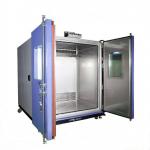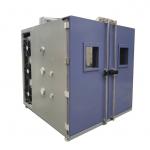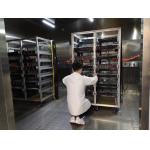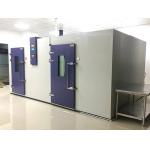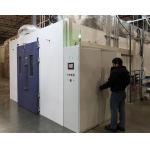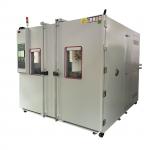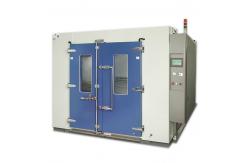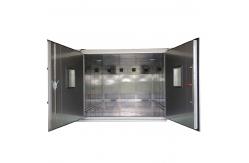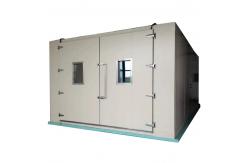In the automotive engineering landscape, the performance and
reliability of engines and powertrains are the cornerstones of
vehicle functionality. The Customized Walk-In Environmental
Chamber, designed specifically for their testing, emerges as a
vital asset, enabling comprehensive evaluations under a wide range
of simulated environmental conditions. This state-of-the-art chamber is dedicated to subjecting engines
and powertrains to a multitude of environmental stressors. It
caters to automotive manufacturers, research institutions, and
aftermarket tuning companies. The primary goal is to replicate the
diverse and often extreme conditions that these crucial components
encounter during real-world operation, including varying
temperatures, humidity levels, altitudes, and even dust and
particulate-laden atmospheres. By doing so, it allows for in-depth
analysis of how engines and powertrains perform, ensuring optimal
design, enhanced durability, and improved overall vehicle
performance. - Spacious and Robust Construction
- The walk-in chamber is constructed with a heavy-duty framework,
typically fabricated from high-strength steel alloys, to support
the weight and size of engines and powertrains. The exterior is
engineered to be highly durable and resistant to corrosion,
withstanding the rigors of continuous testing. The interior is
lined with a fireproof and heat-reflective material, ensuring
safety and minimizing heat transfer. The door is designed for easy
access and features a reliable sealing mechanism, incorporating a
high-quality gasket and a multi-point locking system, maintaining a
controlled and stable testing environment. The chamber also
includes a ventilation system to manage exhaust gases and ensure
proper air circulation.
- Precision Environmental Control Systems
- Temperature Control: Capable of maintaining a wide temperature
range, from -40°C to +150°C, with an accuracy of ±1°C. It utilizes
advanced refrigeration and heating technologies, such as
industrial-grade compressors and high-capacity heating elements.
The control system incorporates a feedback loop with strategically
placed temperature sensors, ensuring uniform temperature
distribution throughout the chamber. The user-friendly control
panel allows for precise programming of temperature profiles,
including rapid temperature changes and extended soak times,
mimicking real-world driving conditions like cold starts in winter
or heat soak in traffic.
- Humidity Control: The humidity control system can achieve humidity
levels from 10% to 95% RH, with an accuracy of ±3% RH. It employs a
combination of steam injection and dehumidification techniques,
along with a carefully designed air circulation pattern. Humidity
sensors continuously monitor the internal environment, and the
control system adjusts accordingly to create the desired humidity
levels. This is crucial for testing the effects of moisture on
engine components, such as corrosion of metal parts or the
performance of intake systems in humid conditions.
- Altitude Simulation: The chamber can simulate altitudes up to 5000
meters. By adjusting the air pressure and density, it replicates
the reduced oxygen levels and lower atmospheric pressure at high
altitudes. This enables the evaluation of how engines and
powertrains perform in mountainous regions or during high-altitude
driving, including changes in combustion efficiency, power output,
and turbocharger performance.
- Dust and Particulate Injection: To assess the impact of dirty and
dusty environments, the chamber is equipped with a dust and
particulate injection system. It can introduce controlled amounts
of various types of dust, sand, and other particulates into the
testing environment, allowing for the study of how engines and
powertrains handle the ingress of such contaminants. This is
especially important for off-road and commercial vehicle
applications.
- Advanced Instrumentation and Data Acquisition
- The chamber is outfitted with a comprehensive suite of sensors and
instrumentation. In addition to temperature, humidity, and pressure
sensors, it includes sensors for measuring engine performance
parameters such as torque, horsepower, fuel consumption, and
exhaust emissions. These sensors are connected to a high-speed data
acquisition system that records and stores all the relevant data.
The data acquisition system offers a sampling rate of up to 1000
samples per second, ensuring that even the most rapid changes in
engine performance or environmental conditions are accurately
captured. The collected data can be accessed and analyzed in
real-time or retrieved later for in-depth studies. The system is
also compatible with automotive engineering software, enabling
detailed reports and graphical representations of the test results.
- Safety and Compliance Features
- The Customized Walk-In Environmental Chamber is designed with
multiple safety features. It has an automatic shutdown system in
case of any critical malfunction, such as overheating or excessive
pressure build-up. The fireproof lining and ventilation system help
prevent and manage any potential fire hazards. The chamber also
complies with relevant automotive testing standards and
regulations, ensuring that the testing procedures are reliable and
recognized within the industry.
- Chamber Size and Capacity: The walk-in chamber is available in various sizes, with interior
dimensions ranging from 3 meters x 3 meters x 2 meters to larger
configurations like 10 meters x 5 meters x 4 meters. This allows
for the accommodation of different sizes and types of engines and
powertrains, from small automotive engines to large commercial or
industrial power units.
- Temperature Cycling Rate: Can perform temperature cycles at a rate of 2 to 5 cycles per
hour, depending on the specific test requirements. For example, it
can rapidly cool from +80°C to -20°C in a matter of minutes and
then heat back up, subjecting the engine or powertrain to
significant thermal stress, which is essential for evaluating
thermal fatigue resistance.
- Humidity Cycling Rate: The humidity can be cycled within 15 to 30 minutes, allowing for
the simulation of rapid changes in moisture conditions, such as
transitioning from a dry desert environment to a humid
rainforest-like atmosphere.
- Altitude Change Rate: The chamber can simulate changes in altitude at a rate of up to
1000 meters per minute, replicating the rapid ascents and descents
that vehicles may experience in mountainous terrains.
- Dust and Particulate Concentration: The dust and particulate injection system can introduce
concentrations ranging from 10 milligrams per cubic meter to 1000
milligrams per cubic meter, depending on the desired test severity.
- Data Acquisition Rate: The high-speed data acquisition system samples sensor data at a
rate of 500 to 1000 samples per second, providing detailed and
accurate information about the engine and powertrain performance
during testing.
- Realistic Environmental Simulation for Engine and Powertrain
Evaluation
- The primary function of this chamber is to provide a highly
accurate and realistic simulation of the environmental conditions
that engines and powertrains face. By precisely controlling
temperature, humidity, altitude, and particulate levels, it allows
for the assessment of how these components perform in different
scenarios. For example, it can determine if an engine's fuel
injection system needs to be adjusted for optimal performance at
high altitudes or if a powertrain's cooling system is sufficient to
handle extreme heat. This information is invaluable for automotive
engineers to optimize designs, improve efficiency, and enhance the
overall reliability of engines and powertrains.
- The ability to conduct repeatable tests with different
environmental profiles is also a crucial function. This helps in
comparing the performance of different engine models or powertrain
configurations and identifying the most suitable design for
specific applications. For instance, a manufacturer can test
multiple prototypes of an engine under the same set of temperature
and altitude cycling conditions and analyze the results to select
the best-performing version.
|
